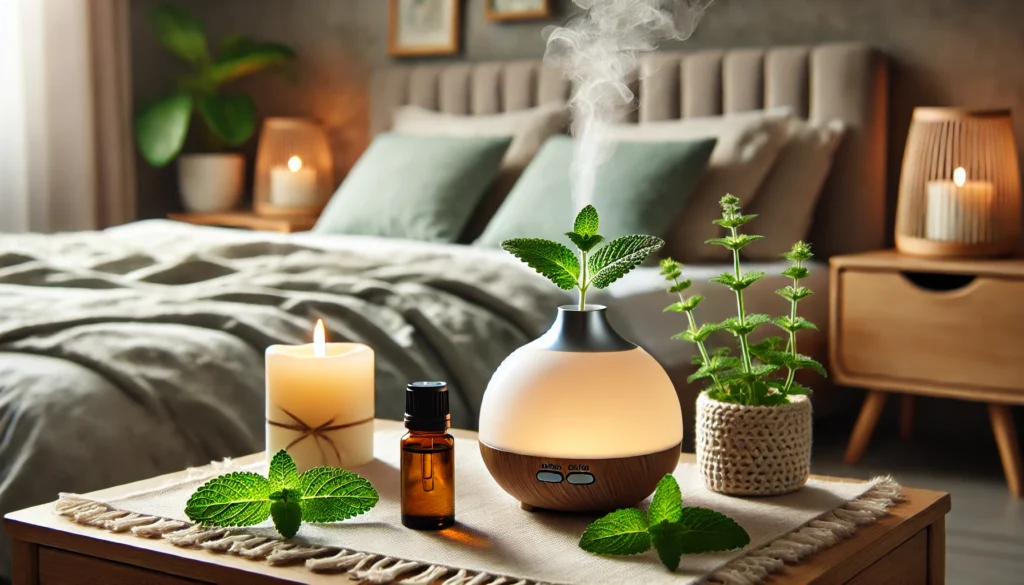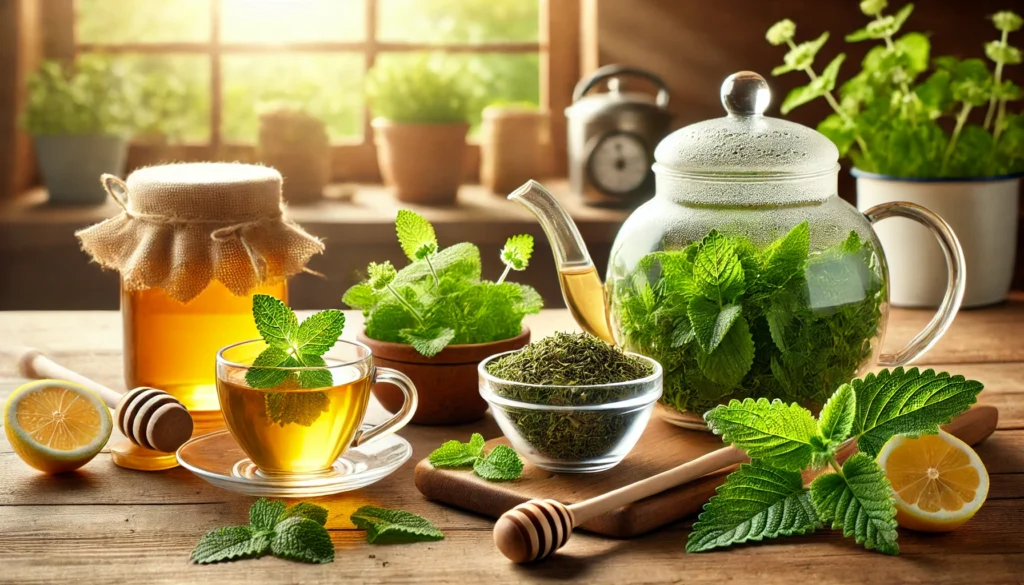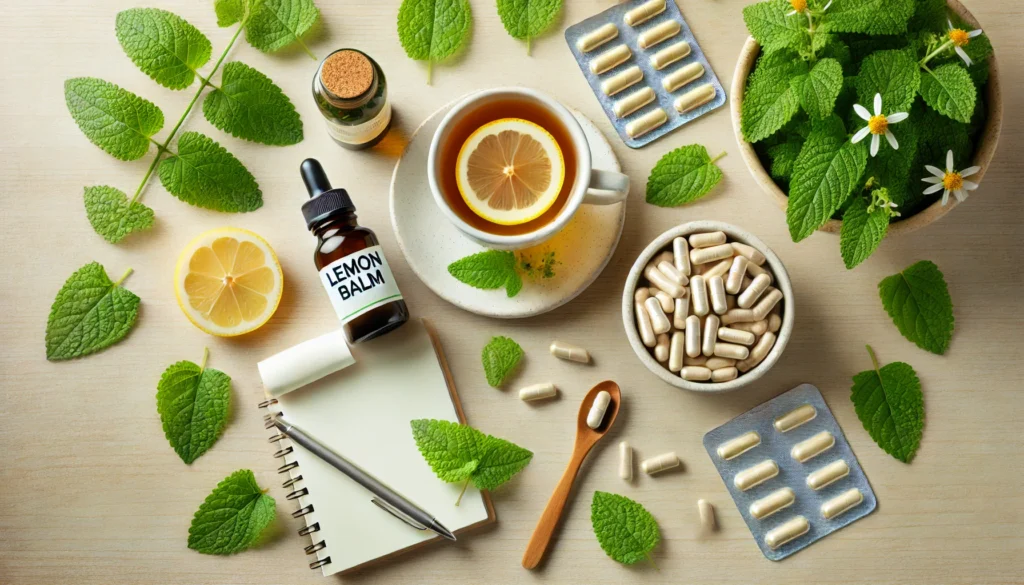Anxiety is a common ailment in today’s fast-paced world. Many are seeking natural remedies to manage their symptoms.
One such remedy is lemon balm. This perennial herb from the mint family has been used for centuries to soothe the mind and body.
But does lemon balm really work for anxiety?
This article delves into the potential benefits of lemon balm for anxiety relief. We’ll explore its historical use, the science behind its calming effects, and personal testimonials.
We’ll also provide practical advice on how to incorporate lemon balm into your wellness routine. This includes information on dosage, forms, and potential interactions.
Whether you’re a health coach, a science journalist, or a biohacker, this comprehensive guide aims to provide you with the information you need.
So, let’s embark on this journey to understand how lemon balm might help manage anxiety.
You may also like: Top Supplements to Alleviate Anxiety Naturally

The Historical and Modern Use of Lemon Balm for Anxiety
Lemon balm, or Melissa officinalis, boasts a rich history in medicinal use. Dating back to the Middle Ages, it was prized for its calming properties. Not just an herb for the anxious mind, it also promoted restful sleep and a healthy appetite.
The people of ancient Greece and Rome valued lemon balm for its healing prowess. It was a staple in both households and apothecaries. Known for its aromatic leaves, it was often used in teas and tinctures to ease tension. During the Renaissance, herbalists recommended it for nervous disorders, trusting its soothing effects.
Fast forward to today, lemon balm continues to be a popular choice for stress relief. As the demand for natural remedies grows, it’s seen a resurgence in modern medicine. Part of what makes lemon balm attractive is its multi-faceted approach to wellness. It’s not just for anxiety; its benefits extend to mood and cognitive function.
Key benefits people seek from lemon balm include:
- Stress relief and calming effects
- Enhanced sleep quality
- Improved mood and mental clarity
In recent years, scientific studies have begun to corroborate what was known anecdotally for centuries. Research shows its potential to lower anxiety and stress levels. Lemon balm’s reputation as a natural anxiety remedy has solidified its place in herbal medicine cabinets. Many use it as a first line of defense against daily stressors.
In both historical and modern contexts, lemon balm has retained its importance as a versatile, natural solution. Its enduring presence highlights its effectiveness and ease of use. With growing interest in natural anxiety treatments, lemon balm remains a steadfast ally in the quest for mental peace.
Understanding Lemon Balm’s Anxiolytic Properties
Lemon balm’s ability to ease anxiety is attributed to its anxiolytic properties. These properties work to calm the nervous system, reducing stress and anxiety levels. This is largely due to its active compounds.
Among these compounds, rosmarinic acid plays a crucial role. It provides antioxidant and antimicrobial benefits, supporting overall brain health. This compound is significant in the herb’s calming efficacy.
Moreover, lemon balm influences the brain’s neurotransmitters. It enhances the availability of gamma-aminobutyric acid (GABA), a neurotransmitter vital for relaxation. This mechanism is key for its stress-relief benefits.
Interestingly, lemon balm doesn’t just calm; it also enhances cognitive function. Studies suggest it can sharpen mental clarity and boost mood. These dual benefits make it an appealing natural remedy.
Furthermore, this herb is versatile in its application. It can be brewed as tea, taken as supplements, or applied topically. Each method offers unique benefits and fits different lifestyle needs.
Ultimately, lemon balm stands out for its dual action: reducing anxiety while enhancing mental function. Its comprehensive benefits make it a staple for those seeking natural anxiety relief. This herb offers hope for holistic mental health care.
The Science Behind Lemon Balm and GABA
The relationship between lemon balm and GABA is pivotal. GABA is a neurotransmitter that inhibits nerve transmission, producing a calming effect. Lemon balm’s compounds enhance GABA’s presence in the brain.
This enhancement promotes relaxation, reducing feelings of stress and anxiety. By boosting GABA, lemon balm helps stabilize mood and quiet the mind. Scientific studies support its effectiveness in reducing anxiety symptoms.
Research demonstrates lemon balm’s impact on GABA by showing reduced anxiety in clinical trials. Participants often report feeling calmer and experiencing less mental stress. These findings underscore the herb’s potential as an anxiety treatment.
Beyond affecting GABA, lemon balm influences other brain chemicals. It may increase serotonin, which also aids in mood regulation. These combined effects make lemon balm an attractive natural remedy for anxiety relief.
Lemon Balm in Aromatherapy and Mood Enhancement
Lemon balm is a key player in aromatherapy. Its fresh citrus scent uplifts mood and reduces stress. When inhaled, it may also improve cognitive performance.
Aromatherapy using lemon balm can create an environment of tranquility. This can be especially helpful during stressful days or before bedtime. The aroma itself can elicit a sense of calm and balance.
Additionally, using lemon balm in aromatherapy can complement other mood-enhancing practices. It can be paired with meditation or mindfulness exercises, increasing their effectiveness. Combining these practices can further enhance mental well-being.
Clinical Evidence Supporting Lemon Balm’s Efficacy
Lemon balm has garnered scientific interest for its potential in treating anxiety. Several studies back its calming properties, verifying its ancient medicinal use. One such study highlighted its efficacy in reducing stress.
Participants who took lemon balm supplements reported decreased anxiety levels. They also experienced improved mood and alertness. This provides a compelling case for lemon balm as a viable herbal anxiety treatment.
Furthermore, a placebo-controlled trial reinforced these findings. In this trial, individuals using lemon balm extract noticed significant reductions in anxiety. This was compared to those who received a placebo, highlighting the herb’s impact.
Long-term studies have shown that lemon balm can sustain mental clarity. Its regular use in controlled settings demonstrated not just anxiety relief but also cognitive enhancement. This dual benefit is particularly noteworthy in natural remedies.
The scientific consensus confirms the herb’s role in managing anxiety. This supports lemon balm’s place among effective stress relief herbs. It’s a testament to how natural alternatives can rival conventional treatments.
Personal Testimonials: “Lemon Balm Cured My Anxiety”
Beyond scientific validation, personal stories also elevate lemon balm’s reputation. Many individuals share their experiences, claiming “lemon balm cured my anxiety.” Their anecdotes add a personal dimension to its efficacy.
These testimonials often highlight the herb’s swift action and profound impact. Users report fewer anxiety attacks and improved mental health. Such experiences bring hope to others seeking natural anxiety remedies.
These personal accounts should be approached as complementary to scientific evidence. They illustrate real-world effectiveness and inspire those hesitant about herbal anxiety treatments. Together, they form a compelling narrative of lemon balm’s capabilities.
How to Use Lemon Balm for Anxiety Relief
Incorporating lemon balm into your anxiety management routine can be simple. This herb is versatile and can be consumed in several forms. From teas to tinctures, options abound for different preferences.
Tea is one of the most popular methods. Brewing dried lemon balm leaves in hot water releases its soothing essence. This method is both refreshing and calming.
For those who prefer convenience, capsules and extracts are available. These provide a more concentrated form of lemon balm. They are easy to add to your daily supplement regimen.
Besides these, lemon balm can also be used topically. Infused oils or creams are applied to the skin. While not as common, they offer direct, localized relaxation.
With various choices, finding the right form can be crucial. Here are some typical methods of consuming lemon balm:
- Tea: Brew a few leaves in hot water.
- Capsules: Take as directed, often with meals.
- Extracts: Add drops to a drink or take directly.
- Topical Applications: Use as a balm or in lotions.
Dosage and Forms of Lemon Balm
Determining the right dosage ensures optimal benefits from lemon balm. While personal needs vary, general guidelines exist. Most studies use 300 mg to 600 mg of extract for anxiety relief.
Tea drinkers might opt for a cup brewed from two to three teaspoons of leaves. This can be adjusted based on individual taste and effect. It’s a relaxing ritual that can suit many lifestyles.
Other forms, such as capsules or tinctures, offer specific dosages. These generally allow for more precise control. Reading product instructions will guide proper usage.
A variety of lemon balm forms are available, each with its own dosage recommendations:
- Tea: One to two cups daily.
- Capsules: Typically 300 mg to 600 mg per day.
- Extracts: Often calibrated for dropper measurements.
Safety Profile and Potential Interactions
Lemon balm is largely considered safe for most people. Side effects are usually mild, such as stomach upset or dizziness. However, caution is still advised.
This herb may interact with certain medications. Individuals on sedatives or thyroid treatments should consult a healthcare provider. Personalized advice ensures no adverse reactions.
Starting any new supplement regimen warrants a discussion with your healthcare professional. This is crucial to prevent potential interactions. Safety should be the primary consideration in embracing herbal remedies.

The Role of Lemon Balm in Holistic Anxiety Treatment
Lemon balm offers an integrated approach to anxiety management. It’s not just about calming the mind but nurturing the whole body. This aligns well with holistic principles focused on balanced well-being.
Herbal anxiety treatments like lemon balm complement lifestyle changes. They create a synergy that enhances mental and physical health. Together, they form a comprehensive approach to reducing stress.
In holistic health, natural remedies are just one piece of the puzzle. Combining them with good nutrition and regular exercise increases their effectiveness. Mindfulness practices also play a critical role.
Lemon balm, as a part of a holistic regimen, supports mental clarity and resilience. This encourages a state of calm and focus. It helps individuals create sustainable, long-term relief from anxiety.
Incorporating Lemon Balm into a Stress Management Routine
Including lemon balm in your stress management strategy can be seamless. Start with small, consistent steps. Simple routines can lead to significant changes.
Blend lemon balm tea into your evening wind-down. This not only calms but prepares the body for restful sleep. The nightly ritual strengthens relaxation over time.
For comprehensive care, pair lemon balm use with other stress-reducing practices. Daily meditation, breathing exercises, or gentle yoga can amplify its effects. Creating a balanced routine is key to enhanced anxiety relief.
Lemon Balm as a Cognitive Enhancer and Sleep Aid
Lemon balm is more than just a stress relief herb; it also enhances cognitive functions. Its effects are linked to the improvement of mental sharpness and clarity. People often seek these benefits to boost their daily productivity.
By improving neurotransmitter function, lemon balm promotes alertness and focus. This can lead to better performance in tasks requiring concentration. It’s a natural way to support cognitive health without resorting to chemical stimulants.
Moreover, lemon balm has shown promise in aiding sleep quality. A good night’s rest is crucial for overall well-being and mental health. Thus, lemon balm plays a dual role in managing anxiety and enhancing sleep.
The calming properties of lemon balm further contribute to its sleep-promoting effects. By reducing stress levels, it helps induce sleep more naturally. As a result, users experience a more restful and rejuvenating slumber.
Cognitive Benefits and Mental Clarity
The cognitive benefits of lemon balm stem from its interaction with brain chemistry. Research suggests it increases the availability of neurotransmitters like acetylcholine. This promotes enhanced memory, focus, and processing speed.
Regular use of lemon balm can lead to noticeable improvements in mental clarity. It sharpens the mind for complex problem-solving and decision-making. Many find their productivity and efficiency heightened as a result.
Lemon balm’s support for mental clarity is not just scientific; anecdotal evidence abounds. Many individuals report feeling mentally sharper and more alert. Its natural properties make it a favorite among those who prioritize cognitive health.
Improving Sleep Quality with Lemon Balm
Lemon balm’s potential to improve sleep quality is gaining attention. Its calming effects help the mind unwind, facilitating easier sleep onset. Those with insomnia or restless nights may find relief in this herb.
Using lemon balm as a sleep aid involves establishing a routine. Evening consumption, particularly as a tea, can help signal the body to wind down. This soothing ritual contributes to more consistent and restorative sleep patterns.
The herb also assists in maintaining sleep, preventing frequent awakenings. Its gentle sedative properties ensure a deeper, more satisfying sleep cycle. With lemon balm, you’re nurturing a natural path to better rest and overall health.

The Future of Lemon Balm in Anxiety Treatment
Lemon balm’s role in anxiety treatment continues to expand as interest in natural therapies grows. This herb’s historical reputation and modern research spark curiosity and hope. As more people seek herbal anxiety treatments, the demand for lemon balm rises.
Current studies suggest it could be a key player in holistic anxiety management. Its appeal lies in its natural origins and minimal side effects. This positions lemon balm as an attractive option for those wary of pharmaceuticals.
Looking ahead, increased availability and awareness may lead to broader acceptance. Integrating lemon balm into mainstream treatments requires ongoing validation. This could reshape anxiety treatment landscapes, emphasizing natural and integrated approaches.
The Need for Further Research
Despite promising findings, more research on lemon balm is necessary. Large-scale, randomized trials will help confirm its effects and safety. Such studies can provide clear guidelines for its use in anxiety treatment.
Understanding how lemon balm works with the brain will enhance its application. Continued research may also reveal new benefits. This knowledge can optimize its integration into therapeutic practices and improve anxiety management strategies.
Sustainable Sourcing and Community Support
Sustainable sourcing of lemon balm is essential as demand grows. Responsible production ensures that this valuable resource remains available. It also supports the environmental health and quality of lemon balm supplements.
Community support plays a vital role in promoting mindful consumption. Sharing experiences and knowledge benefits those new to natural remedies. This collective wisdom enhances sustainable practices and enriches the use of herbal treatments like lemon balm.
Conclusion: Is Lemon Balm Right for You?
Lemon balm offers a promising, natural route for managing anxiety. Yet, its suitability varies for each individual. Some find its calming effects profound, while others need additional support.
Before incorporating lemon balm into your routine, consider consulting a healthcare professional. They can provide personalized advice and ensure it complements your existing treatments. Embrace this journey thoughtfully, balancing natural remedies with scientific wisdom for optimal well-being.
Further Reading:
A Dietitian’s Picks of the 6 Best Herbs to Help Manage Anxiety
Lemon balm: Uses and health benefits
Important Note: The information contained in this article is for general informational purposes only, and should not be construed as health or medical advice, nor is it intended to diagnose, prevent, treat, or cure any disease or health condition. Before embarking on any diet, fitness regimen, or program of nutritional supplementation, it is advisable to consult your healthcare professional in order to determine its safety and probable efficacy in terms of your individual state of health.
Regarding Nutritional Supplements Or Other Non-Prescription Health Products: If any nutritional supplements or other non-prescription health products are mentioned in the foregoing article, any claims or statements made about them have not been evaluated by the U.S. Food and Drug Administration, and such nutritional supplements or other health products are not intended to diagnose, treat, cure, or prevent any disease.


